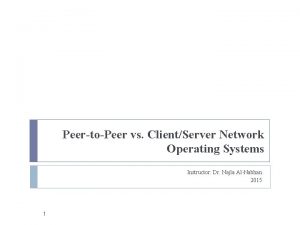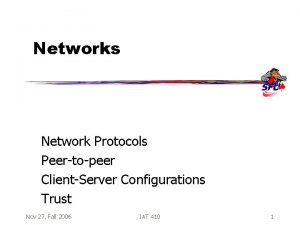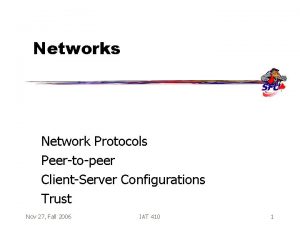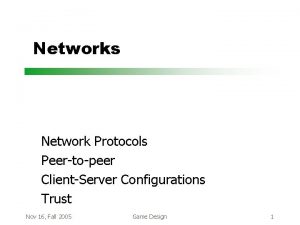Networks ClientServer And PeertoPeer ClientServer Networks In a










- Slides: 10

Networks Client/Server And Peer-to-Peer

Client/Server Networks In a client/server network, the server computers manage the resources on a network and perform a variety of functions for the client computers. n Mainly used in businesses. n

Client Computers n Usually personal computers or workstations. n They are linked to the server computer.

Server Computers n Server computers can be as small as a personal computer or it can be as large as a supercomputer. n The central computer(s) in a client/server network.

Advantages and Disadvantages of Client/Server Networking n Advantages include – Centralization - Resources and data security are controlled through the server. – Scalability - Any or all elements can be replaced individually as needs increase. – Flexibility - New technology can be easily integrated into system. – Interoperability - All components (client/network/server) work together. – Accessibility - Server can be accessed remotely and across multiple platforms. n Disadvantages include – Expense - Requires initial investment in dedicated server. – Maintenance - Large networks will require a staff to ensure efficient operation. – Dependence - When server goes down, operations will cease across the network.

Peer-to-Peer Networks n In peer-to-peer networks, all computers are equal. Any computer can be a client to another computer or any computer can share files with any other computer. n There is no file server or centralized computer.

Advantages and Disadvantages of Peer-to-Peer Networking n Advantages – Less initial expense No need for a dedicated server. – Setup - An operating system (such as Windows XP) already in place may only need to be reconfigured for peer-to-peer operations. n Disadvantages – Decentralized - No central repository for files and applications. – Security - Does not provide the security available on a client/server network.

Where are they used? Peer-to-peer networks are used mainly for small numbers of personal computers. Examples include Apple. Share and Windows for Workgroups n Client/server networks are used for mainly for business because they can link hundreds of clients. Examples include Novell Netware and Windows 2000 Server. n

Main Differences n The main differences include – Size of the Network – Security – Setup of file sharing – Expenses – Maintenance

Resources n Computers Information Technology in Perspective by Long and Long n Florida Center for Instructional Technology College of Education


















